Physics Read online
Page 4
Again, matter is a relative term: to each form there corresponds a special matter. How far then must the physicist know the form or essence? Up to a point, perhaps, as the doctor must know sinew or the smith bronze (i.e. until he understands the purpose of each): and the physicist is concerned only with things whose forms are separable indeed, but do not exist apart from matter. Man is begotten by man and by the sun as well. The mode of existence and essence of the separable it is the business of the primary type of philosophy to define.
3
Now that we have established these distinctions, we must proceed to consider causes, their character and number. Knowledge is the object of our inquiry, and men do not think they know a thing till they have grasped the 'why' of (which is to grasp its primary cause). So clearly we too must do this as regards both coming to be and passing away and every kind of physical change, in order that, knowing their principles, we may try to refer to these principles each of our problems.
In one sense, then, (1) that out of which a thing comes to be and which persists, is called 'cause', e.g. the bronze of the statue, the silver of the bowl, and the genera of which the bronze and the silver are species.
In another sense (2) the form or the archetype, i.e. the statement of the essence, and its genera, are called 'causes' (e.g. of the octave the relation of 2:1, and generally number), and the parts in the definition.
Again (3) the primary source of the change or coming to rest; e.g. the man who gave advice is a cause, the father is cause of the child, and generally what makes of what is made and what causes change of what is changed.
Again (4) in the sense of end or 'that for the sake of which' a thing is done, e.g. health is the cause of walking about. ('Why is he walking about?' we say. 'To be healthy', and, having said that, we think we have assigned the cause.) The same is true also of all the intermediate steps which are brought about through the action of something else as means towards the end, e.g. reduction of flesh, purging, drugs, or surgical instruments are means towards health. All these things are 'for the sake of' the end, though they differ from one another in that some are activities, others instruments.
This then perhaps exhausts the number of ways in which the term 'cause' is used.
As the word has several senses, it follows that there are several causes of the same thing not merely in virtue of a concomitant attribute), e.g. both the art of the sculptor and the bronze are causes of the statue. These are causes of the statue qua statue, not in virtue of anything else that it may be-only not in the same way, the one being the material cause, the other the cause whence the motion comes. Some things cause each other reciprocally, e.g. hard work causes fitness and vice versa, but again not in the same way, but the one as end, the other as the origin of change. Further the same thing is the cause of contrary results. For that which by its presence brings about one result is sometimes blamed for bringing about the contrary by its absence. Thus we ascribe the wreck of a ship to the absence of the pilot whose presence was the cause of its safety.
All the causes now mentioned fall into four familiar divisions. The letters are the causes of syllables, the material of artificial products, fire, of bodies, the parts of the whole, and the premisses of the conclusion, in the sense of 'that from which'. Of these pairs the one set are causes in the sense of substratum, e.g. the parts, the other set in the sense of essence-the whole and the combination and the form. But the seed and the doctor and the adviser, and generally the maker, are all sources whence the change or stationariness originates, while the others are causes in the sense of the end or the good of the rest; for 'that for the sake of which' means what is best and the end of the things that lead up to it. (Whether we say the 'good itself or the 'apparent good' makes no difference.)
Such then is the number and nature of the kinds of cause.
Now the modes of causation are many, though when brought under heads they too can be reduced in number. For 'cause' is used in many senses and even within the same kind one may be prior to another (e.g. the doctor and the expert are causes of health, the relation 2:1 and number of the octave), and always what is inclusive to what is particular. Another mode of causation is the incidental and its genera, e.g. in one way 'Polyclitus', in another 'sculptor' is the cause of a statue, because 'being Polyclitus' and 'sculptor' are incidentally conjoined. Also the classes in which the incidental attribute is included; thus 'a man' could be said to be the cause of a statue or, generally, 'a living creature'. An incidental attribute too may be more or less remote, e.g. suppose that 'a pale man' or 'a musical man' were said to be the cause of the statue.
All causes, both proper and incidental, may be spoken of either as potential or as actual; e.g. the cause of a house being built is either 'house-builder' or 'house-builder building'.
Similar distinctions can be made in the things of which the causes are causes, e.g. of 'this statue' or of 'statue' or of 'image' generally, of 'this bronze' or of 'bronze' or of 'material' generally. So too with the incidental attributes. Again we may use a complex expression for either and say, e.g. neither 'Polyclitus' nor 'sculptor' but 'Polyclitus, sculptor'.
All these various uses, however, come to six in number, under each of which again the usage is twofold. Cause means either what is particular or a genus, or an incidental attribute or a genus of that, and these either as a complex or each by itself; and all six either as actual or as potential. The difference is this much, that causes which are actually at work and particular exist and cease to exist simultaneously with their effect, e.g. this healing person with this being-healed person and that house-building man with that being-built house; but this is not always true of potential causes--the house and the housebuilder do not pass away simultaneously.
In investigating the cause of each thing it is always necessary to seek what is most precise (as also in other things): thus man builds because he is a builder, and a builder builds in virtue of his art of building. This last cause then is prior: and so generally.
Further, generic effects should be assigned to generic causes, particular effects to particular causes, e.g. statue to sculptor, this statue to this sculptor; and powers are relative to possible effects, actually operating causes to things which are actually being effected.
This must suffice for our account of the number of causes and the modes of causation.
4
But chance also and spontaneity are reckoned among causes: many things are said both to be and to come to be as a result of chance and spontaneity. We must inquire therefore in what manner chance and spontaneity are present among the causes enumerated, and whether they are the same or different, and generally what chance and spontaneity are.
Some people even question whether they are real or not. They say that nothing happens by chance, but that everything which we ascribe to chance or spontaneity has some definite cause, e.g. coming 'by chance' into the market and finding there a man whom one wanted but did not expect to meet is due to one's wish to go and buy in the market. Similarly in other cases of chance it is always possible, they maintain, to find something which is the cause; but not chance, for if chance were real, it would seem strange indeed, and the question might be raised, why on earth none of the wise men of old in speaking of the causes of generation and decay took account of chance; whence it would seem that they too did not believe that anything is by chance. But there is a further circumstance that is surprising. Many things both come to be and are by chance and spontaneity, and although know that each of them can be ascribed to some cause (as the old argument said which denied chance), nevertheless they speak of some of these things as happening by chance and others not. For this reason also they ought to have at least referred to the matter in some way or other.
Certainly the early physicists found no place for chance among the causes which they recognized-love, strife, mind, fire, or the like. This is strange, whether they supposed that there is no such thing as chance or whether they thought there is but omitted to mention it-a
nd that too when they sometimes used it, as Empedocles does when he says that the air is not always separated into the highest region, but 'as it may chance'. At any rate he says in his cosmogony that 'it happened to run that way at that time, but it often ran otherwise.' He tells us also that most of the parts of animals came to be by chance.
There are some too who ascribe this heavenly sphere and all the worlds to spontaneity. They say that the vortex arose spontaneously, i.e. the motion that separated and arranged in its present order all that exists. This statement might well cause surprise. For they are asserting that chance is not responsible for the existence or generation of animals and plants, nature or mind or something of the kind being the cause of them (for it is not any chance thing that comes from a given seed but an olive from one kind and a man from another); and yet at the same time they assert that the heavenly sphere and the divinest of visible things arose spontaneously, having no such cause as is assigned to animals and plants. Yet if this is so, it is a fact which deserves to be dwelt upon, and something might well have been said about it. For besides the other absurdities of the statement, it is the more absurd that people should make it when they see nothing coming to be spontaneously in the heavens, but much happening by chance among the things which as they say are not due to chance; whereas we should have expected exactly the opposite.
Others there are who, indeed, believe that chance is a cause, but that it is inscrutable to human intelligence, as being a divine thing and full of mystery.
Thus we must inquire what chance and spontaneity are, whether they are the same or different, and how they fit into our division of causes.
5
First then we observe that some things always come to pass in the same way, and others for the most part. It is clearly of neither of these that chance is said to be the cause, nor can the 'effect of chance' be identified with any of the things that come to pass by necessity and always, or for the most part. But as there is a third class of events besides these two-events which all say are 'by chance'-it is plain that there is such a thing as chance and spontaneity; for we know that things of this kind are due to chance and that things due to chance are of this kind.
But, secondly, some events are for the sake of something, others not. Again, some of the former class are in accordance with deliberate intention, others not, but both are in the class of things which are for the sake of something. Hence it is clear that even among the things which are outside the necessary and the normal, there are some in connexion withwhich the phrase 'for the sake of something' is applicable. (Events that are for the sake of something include whatever may be done as a result of thought or of nature.) Things of this kind, then, when they come to pass incidental are said to be 'by chance'. For just as a thing is something either in virtue of itself or incidentally, so may it be a cause. For instance, the housebuilding faculty is in virtue of itself the cause of a house, whereas the pale or the musical is the incidental cause. That which is per se cause of the effect is determinate, but the incidental cause is indeterminable, for the possible attributes of an individual are innumerable. To resume then; when a thing of this kind comes to pass among events which are for the sake of something, it is said to be spontaneous or by chance. (The distinction between the two must be made later-for the present it is sufficient if it is plain that both are in the sphere of things done for the sake of something.)
Example: A man is engaged in collecting subscriptions for a feast. He would have gone to such and such a place for the purpose of getting the money, if he had known. He actually went there for another purpose and it was only incidentally that he got his money by going there; and this was not due to the fact that he went there as a rule or necessarily, nor is the end effected (getting the money) a cause present in himself-it belongs to the class of things that are intentional and the result of intelligent deliberation. It is when these conditions are satisfied that the man is said to have gone 'by chance'. If he had gone of deliberate purpose and for the sake of this-if he always or normally went there when he was collecting payments-he would not be said to have gone 'by chance'.
It is clear then that chance is an incidental cause in the sphere of those actions for the sake of something which involve purpose. Intelligent reflection, then, and chance are in the same sphere, for purpose implies intelligent reflection.
It is necessary, no doubt, that the causes of what comes to pass by chance be indefinite; and that is why chance is supposed to belong to the class of the indefinite and to be inscrutable to man, and why it might be thought that, in a way, nothing occurs by chance. For all these statements are correct, because they are well grounded. Things do, in a way, occur by chance, for they occur incidentally and chance is an incidental cause. But strictly it is not the cause-without qualification-of anything; for instance, a housebuilder is the cause of a house; incidentally, a fluteplayer may be so.
And the causes of the man's coming and getting the money (when he did not come for the sake of that) are innumerable. He may have wished to see somebody or been following somebody or avoiding somebody, or may have gone to see a spectacle. Thus to say that chance is a thing contrary to rule is correct. For 'rule' applies to what is always true or true for the most part, whereas chance belongs to a third type of event. Hence, to conclude, since causes of this kind are indefinite, chance too is indefinite. (Yet in some cases one might raise the question whether any incidental fact might be the cause of the chance occurrence, e.g. of health the fresh air or the sun's heat may be the cause, but having had one's hair cut cannot; for some incidental causes are more relevant to the effect than others.)
Chance or fortune is called 'good' when the result is good, 'evil' when it is evil. The terms 'good fortune' and 'ill fortune' are used when either result is of considerable magnitude. Thus one who comes within an ace of some great evil or great good is said to be fortunate or unfortunate. The mind affirms the essence of the attribute, ignoring the hair's breadth of difference. Further, it is with reason that good fortune is regarded as unstable; for chance is unstable, as none of the things which result from it can be invariable or normal.
Both are then, as I have said, incidental causes-both chance and spontaneity-in the sphere of things which are capable of coming to pass not necessarily, nor normally, and with reference to such of these as might come to pass for the sake of something.
6
They differ in that 'spontaneity' is the wider term. Every result of chance is from what is spontaneous, but not everything that is from what is spontaneous is from chance.
Chance and what results from chance are appropriate to agents that are capable of good fortune and of moral action generally. Therefore necessarily chance is in the sphere of moral actions. This is indicated by the fact that good fortune is thought to be the same, or nearly the same, as happiness, and happiness to be a kind of moral action, since it is well-doing. Hence what is not capable of moral action cannot do anything by chance. Thus an inanimate thing or a lower animal or a child cannot do anything by chance, because it is incapable of deliberate intention; nor can 'good fortune' or 'ill fortune' be ascribed to them, except metaphorically, as Protarchus, for example, said that the stones of which altars are made are fortunate because they are held in honour, while their fellows are trodden under foot. Even these things, however, can in a way be affected by chance, when one who is dealing with them does something to them by chance, but not otherwise.
The spontaneous on the other hand is found both in the lower animals and in many inanimate objects. We say, for example, that the horse came 'spontaneously', because, though his coming saved him, he did not come for the sake of safety. Again, the tripod fell 'of itself', because, though when it fell it stood on its feet so as to serve for a seat, it did not fall for the sake of that.
Hence it is clear that events which (1) belong to the general class of things that may come to pass for the sake of something, (2) do not come to pass for the sake of what actually results, and (3) have an ex
ternal cause, may be described by the phrase 'from spontaneity'. These 'spontaneous' events are said to be 'from chance' if they have the further characteristics of being the objects of deliberate intention and due to agents capable of that mode of action. This is indicated by the phrase 'in vain', which is used when A which is for the sake of B, does not result in B. For instance, taking a walk is for the sake of evacuation of the bowels; if this does not follow after walking, we say that we have walked 'in vain' and that the walking was 'vain'. This implies that what is naturally the means to an end is 'in vain', when it does not effect the end towards which it was the natural means-for it would be absurd for a man to say that he had bathed in vain because the sun was not eclipsed, since the one was not done with a view to the other. Thus the spontaneous is even according to its derivation the case in which the thing itself happens in vain. The stone that struck the man did not fall for the purpose of striking him; therefore it fell spontaneously, because it might have fallen by the action of an agent and for the purpose of striking. The difference between spontaneity and what results by chance is greatest in things that come to be by nature; for when anything comes to be contrary to nature, we do not say that it came to be by chance, but by spontaneity. Yet strictly this too is different from the spontaneous proper; for the cause of the latter is external, that of the former internal.

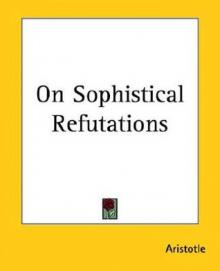 On Sophistical Refutations
On Sophistical Refutations The Categories
The Categories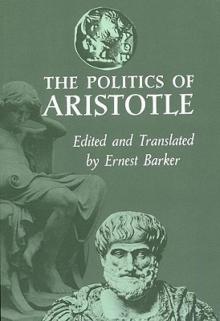 The Politics of Aristotle
The Politics of Aristotle Nicomachean Ethics
Nicomachean Ethics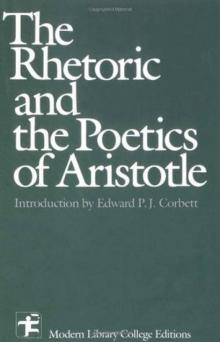 The Rhetoric & the Poetics of Aristotle
The Rhetoric & the Poetics of Aristotle POSTERIOR ANALYTICS
POSTERIOR ANALYTICS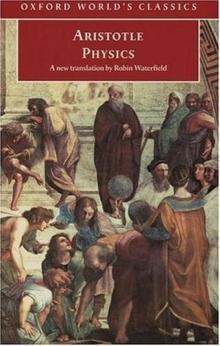 Physics
Physics Metaphysics
Metaphysics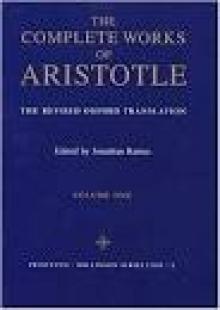 Various Works
Various Works